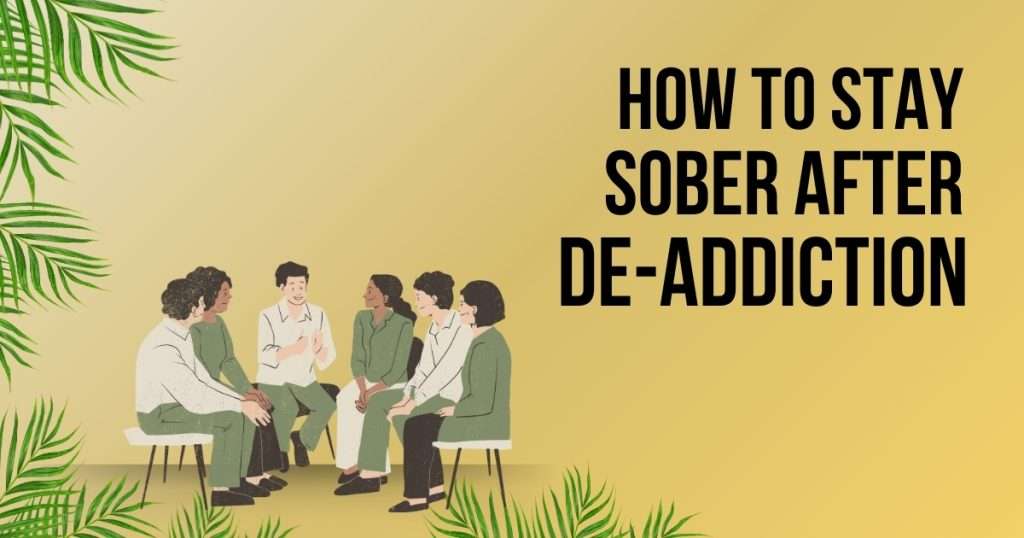Staying sober after going through de-addiction training at rehab is one of the biggest challenges for an alcoholic person. Especially, first three months are especially the most critical period as there is a high chance of relapse of addictive tendencies. Chronic alcohol abuse leads to some behavioral anomalies that lead to tendencies of relapse even after years of DUI rehabilitation. Moreover, facing society after spending a long time under the secured guidance of professionals is quite challenging and individuals experience a sense of insecurity. This insecurity leads to relapse tendencies even more. Here are some important tips on how to stay sober after de-addiction.
Strategies to Avoid Relapsing of Addiction
Refraining from drinking is extremely challenging for individuals and it requires immense control. However, some proven strategies can help individuals to maintain sobriety after rehabilitation. Check out some strategies on how to stay sober after de-addiction.
1. Maintain Rehab Routine
Alcoholic individuals normally have a disorganized routine as they are always under the influence of alcohol. Some common tendencies are sleeping long hours during the day, eating junk food or skipping meals, lack of constructive activities, and so on. These unproductive lifestyles further exacerbate mental health issues and end up in perpetual alcoholism.
After leaving rehab individuals are expected to feel lonely and vulnerable again leading to relapse of alcoholism and DUI tendencies. Thus, it is important to maintain the same habits that they develop in the rehabs. For instance, maintaining a disciplined routine, exercising, eating healthy, etc. This overall routine life helps individuals refrain from alcoholism and integrate into normal social life.
2. Build a Social Network
Addictive individuals are habitually loners. They feel uncomfortable connecting socially and prefer solitude. On the other hand, social ostracization is also a major reason for the social detachment of alcoholic persons. However, it is even more important to make connections and get involved in social activities after rehabilitation.
Any social engagement from the professional sphere to community work is necessary to prevent relapse of alcoholism and DUI tendencies. Positive connections uplift mood, helping individuals to avoid alcoholism and embrace healthy coping mechanisms.
3. Practice Self-Awareness
The main concern and attention of alcoholic individuals is drinking as it provides an escape route for them from stress and anxiety. As a result, they tend to avoid their mental and physical well-being. Continuing within the same neglectful lifestyle is the main reason for rehabilitation and relapse of alcoholic tendencies. It is all the more important to join constructive organizations like professional organizations to prevent relapse.
It provides an opportunity to prove yourself and gain confidence from daily achievements at work. On the other hand, keeping good health is also crucial, such as eating healthy, and maintaining a skincare routine.
4. Set Positive Goals
Setting positive life goals provides a new purpose and hope for a better life. Accomplishing any goals provides a positive self-reinforcement that boosts confidence. For instance, competing in a marathon and winning is a great way to practice self-love and valuation. It is also an excellent way to connect with people and gain social acceptance. Thus, practicing such healthy coping mechanisms helps individuals to fight loneliness, depression, and alcoholism.
5. Inculcate Gratitude
Practicing gratitude is extremely important as that helps you to make good connections and heal better. Normally, societal pressures develop an anti-social mindset in alcoholic people. As a result, they become more isolated from mainstream society and exacerbate their mental health issues.
On the other hand, the ability to feel gratitude towards others helps you to develop a positive attitude towards society. Additionally, having a negative feeling about other people increases mental stress and anxiety. To fight all these vices it is important to make positive social connections and practice gratitude.
Conclusion
The blog has provided some practical tips on how to stay sober after addiction. Hope this proves convincing for you. Make sure you consult top behavioral health services if it becomes overwhelming for you to manage alcoholic or DUI tendencies. Professional behavioral guidance is essential to check DUI or alcoholic tendencies.


